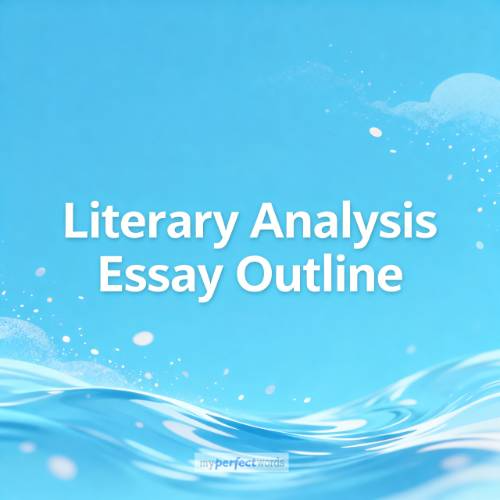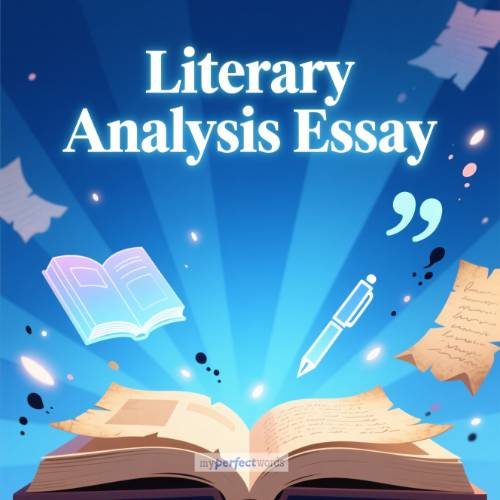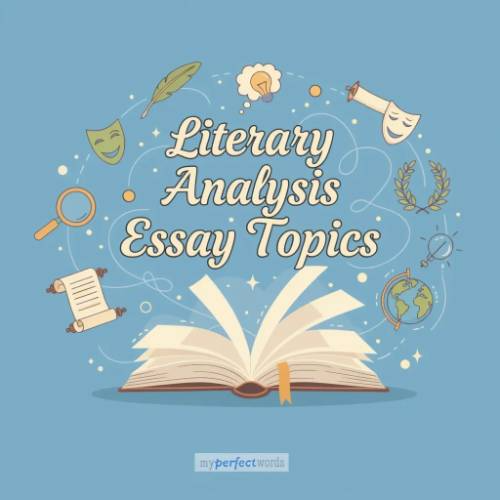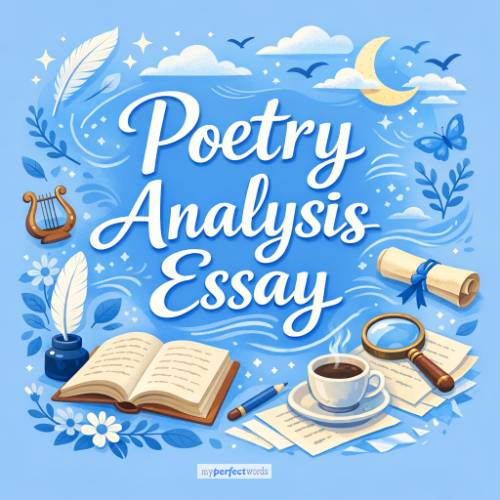Before you pick a template, you need to know what makes an outline actually useful. A good literary analysis outline has three essential components:
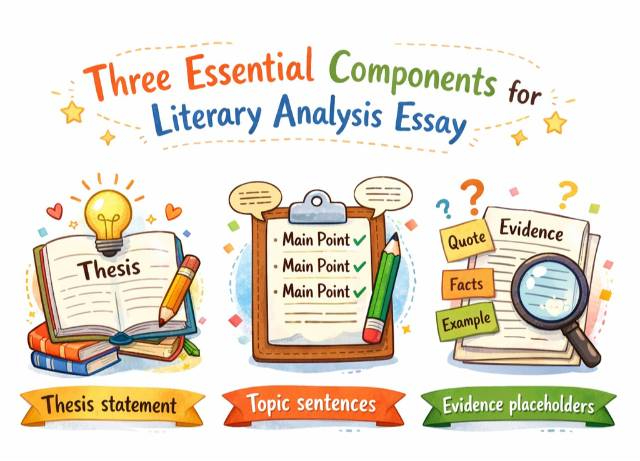
- Thesis statement: Your main argument about the text. Not a summary, but a claim you'll prove.
- Topic sentences: One clear point per body paragraph. Each topic sentence should support your thesis.
- Evidence placeholders: Spots where your quotes will go, with page numbers. If you write "evidence goes here," your outline isn't detailed enough.
Why bother outlining? It prevents disorganized rambling, ensures you have enough evidence before you start writing, and makes the actual drafting process about 3x faster. You're not figuring out structure and content at the same time (you're just expanding what's already there).
| The more detailed your outline, the easier your draft will be. Think of it this way: if you can't write your essay from your outline alone (without looking back at the text), you need more detail. |
6 Literary Analysis Outline Templates
This is why you're here. Pick the template that matches your assignment, copy it, and start filling in the blanks.
Template 1: Basic 5-Paragraph Outline
Best for: High school, first-time literary analysis writers
This is your go-to template if you're just learning literary analysis. It's straightforward, follows the classic essay structure, and works for almost any assignment.
Template 2: MLA Format Outline
Best for: College students, MLA citation required
Title: [Working Title]
I. Introduction
A. Hook/Opening statement
B. Author and work: Full Name, Title (Publication year)
C. Brief plot summary/context (2–3 sentences)
D. Thesis: [Claim] because [Reason 1], [Reason 2], and [Reason 3]
II. First Supporting Point
A. Topic sentence
B. Context for quote
C. Evidence: “___” (Author ###)
D. Interpretation of evidence
E. Connection to thesis
III. Second Supporting Point
A. Topic sentence
B. Context for quote
C. Evidence: “___” (Author ###)
D. Interpretation of evidence
E. Connection to thesis
IV. Third Supporting Point
A. Topic sentence
B. Context for quote
C. Evidence: “___” (Author ###)
D. Interpretation of evidence
E. Connection to thesis
V. Conclusion
A. Restate thesis (different words)
B. Summarize supporting points
C. Broader significance/final insight
| Note: Full MLA formatting guidelines (margins, headers, Works Cited) are in our MLA format guide. |
Template 3: Thematic Analysis Outline
Best for: Theme-focused essays (common in AP Lit)
Central Theme: _________________________________
I. Introduction
Hook connecting theme to universal human experience
Introduce text and author
Thesis: [Author] develops the theme of [theme] through [method 1], [method 2], [method 3]
II. First Thematic Element
How [character/symbol/device] develops theme
Evidence showing this development: “___” (Author ###)
Analysis of deeper meaning
Connection to theme
III. Second Thematic Element
How [different character/symbol/device] develops theme
Evidence showing this development: “___” (Author ###)
Analysis of deeper meaning
Connection to theme
IV. Third Thematic Element
How [another character/symbol/device] develops theme
Evidence showing this development: “___” (Author ###)
Analysis of deeper meaning
Connection to theme
V. Conclusion
Restate how theme is developed across the work
Why this theme matters (universal application)
Final insight about human nature/society
Use this when your assignment asks you to trace a theme throughout the text. It works great for essays about love, power, identity, justice, or any recurring idea.
Template 4: Character Analysis Outline
Best for: Essays focused on character development
Character: _________________________________
I. Introduction
Character’s role in story
Thesis: [Character] transforms from [X] to [Y] through [events/relationships]
II. Character’s Initial State
Description at story’s beginning
Evidence of traits/motivations: “___” (Author ###)
Analysis of what this reveals
III. Catalyst for Change
What triggers character development
Evidence of turning point: “___” (Author ###)
Analysis of internal/external conflict
IV. Character’s Final State
Description at story’s end
Evidence of transformation: “___” (Author ###)
Analysis of how character has changed
V. Conclusion
Significance of character’s arc
What author reveals through this character
Universal insight about human nature
Perfect for assignments about protagonist development, character arcs, or "how does [character] change throughout the novel?"
Template 5: Literary Device Analysis Outline
Best for: When analyzing specific literary techniques
Literary Device: _________________________________ (symbolism, imagery, irony, etc.)
I. Introduction
Brief explanation of the device
Thesis: [Author] uses [device] to [effect/purpose]
II. First Example of Device
Where it appears in text
Evidence: “___” (Author ###)
What it represents/means
How it supports theme/meaning
III. Second Example of Device
Evolution or variation of device
Evidence: “___” (Author ###)
Deeper meaning or new layer
Connection to overall work
IV. Third Example of Device
Culmination or final use
Evidence: “___” (Author ###)
Overall impact on reader
Why author chose this device
V. Conclusion
How device strengthens overall meaning
Effect on reader’s understanding
Use this when your teacher asks you to analyze symbolism, metaphors, foreshadowing, or any specific literary technique.
SHORT ON TIME?
Get a Professionally Written Literary Analysis
Our expert writers can craft a custom essay following any of these outline structures (complete with proper citations and analysis). Ready to meet your deadline?
Template 6: Compare/Contrast Outline
Best for: Analyzing two texts or comparing elements
Texts: [Text 1] and [Text 2]
Focus: _________________________________ (theme, character type, setting, etc.)
I. Introduction
Brief intro to both texts
Thesis: While [Text 1] and [Text 2] both explore [topic], they differ in [approach/conclusion]
II. Similarity 1
How both texts handle [aspect]
Evidence from Text 1: “___” (Author ###)
Evidence from Text 2: “___” (Author ###)
Analysis of what this similarity reveals
III. Difference 1
What Text 1 does
Evidence from Text 1: “___” (Author ###)
What Text 2 does
Evidence from Text 2: “___” (Author ###)
Why this difference matters
IV. Similarity or Difference 2
[Repeat structure]
Evidence from both texts
Analysis
V. Conclusion
What comparison reveals about both works
Broader insight or universal theme
This works for comparing two novels, two characters from the same text, or even two different interpretations of the same theme.
| These templates are starting points (adapt them to your specific assignment). Most essays are 5-7 paragraphs, but adjust based on your professor's requirements. Some teachers want four body paragraphs, others want two. The structure stays the same; you're just adding or removing sections. |
Use Literary Analysis Essay Templates Efficiently
You've got the template. Now what? Here's how to turn it into an actual outline you can write from.
Step 1: Choose your template: Match it to your assignment type. Writing about a theme? Use Template 3. Comparing two books? Template 6. Not sure? Template 1 works for almost everything.
Step 2: Fill in your thesis first: Everything flows from your main argument. Your thesis should make a claim about HOW the author uses literary techniques to create meaning. Not "Romeo and Juliet is about love" but "Shakespeare uses dramatic irony to show that the lovers' deaths result from choice, not fate."
Step 3: Collect your evidence: Find 2-3 quotes per body paragraph that support your points. Write them into your outline with page numbers. If you're writing "evidence goes here," stop and find the actual quote now.
Step 4: Draft from your outline: Turn each bullet into sentences, but keep the structure. Your outline's topic sentence becomes your paragraph's topic sentence. Your outline's evidence becomes integrated quotes in your draft.
Pro tips:
- Save time by filling in topic sentences before finding quotes. You'll know exactly what you're looking for.
- Don't copy quotes into your essay the same way they appear in the outline. Work them into your sentences naturally.
- Some teachers want outlines submitted separately. These templates are submission-ready if needed.
| Not sure what to write about? Check out our literary analysis essay topics for inspiration. |
Filled Out Literary Analysis Essay Template: Romeo & Juliet
Here's what Template 1 looks like when filled out for Romeo and Juliet:

I. INTRODUCTION
A. Hook: “Star-crossed lovers” (but what if fate wasn’t the real villain?)
B. Background: In Romeo and Juliet, Shakespeare’s 1597 tragedy, two teenagers from feuding families fall in love and die together.
C. Thesis: In Romeo and Juliet, Shakespeare uses dramatic irony and foreshadowing to show that the lovers’ deaths result from impulsive choices, not destiny.
II. BODY PARAGRAPH 1: Dramatic Irony
A. Topic sentence: Shakespeare uses dramatic irony to highlight Romeo’s reckless decision-making.
B. Evidence: “O, I am fortune’s fool!” (Shakespeare 3.1.132)
C. Analysis: Romeo blames fate AFTER killing Tybalt, but the audience knows he chose to fight despite Benvolio’s warnings.
D. Link to thesis: This shows Romeo interpreting his choices as fate (the irony reveals Shakespeare’s true message about responsibility).
III. BODY PARAGRAPH 2: Foreshadowing of Consequences
A. Topic sentence: Shakespeare foreshadows tragic outcomes to emphasize that the characters ignore clear warnings.
B. Evidence: “These violent delights have violent ends” (Shakespeare 2.6.9)
C. Analysis: Friar Lawrence warns Romeo directly, but Romeo proceeds with the secret marriage anyway, prioritizing passion over caution.
D. Link to thesis: The foreshadowing shows characters had knowledge of consequences but chose to ignore them.
IV. BODY PARAGRAPH 3: Hasty Decisions Leading to Tragedy
A. Topic sentence: The rushed timeline of events demonstrates how impulsive choices create the tragic ending.
B. Evidence: “Is it e’en so? Then I defy you, stars!” (Shakespeare 5.1.24)
C. Analysis: Romeo doesn’t wait to confirm Juliet’s death or seek advice (he immediately buys poison and rushes to her tomb).
D. Link to thesis: This final impulsive act proves that human choice, not predetermined fate, drives the tragedy.
V. CONCLUSION
A. Restate thesis: Shakespeare crafts a tragedy driven by human choice disguised as destiny.
B. Summarize main points: Through dramatic irony and foreshadowing, the play reveals characters consistently choosing passion over reason.
C. Final thought: The “star-crossed lovers” label becomes the ultimate irony (they weren’t doomed by fate, they doomed themselves).
Notice how the thesis focuses on HOW Shakespeare uses techniques (dramatic irony, foreshadowing) to make a point about the play's meaning. That's what makes it analytical, not just a summary. Each body paragraph proves one part of that thesis with specific evidence.
Literary Analysis Essay Outline Samples
To fully understand a concept in the writing world, literary analysis outline examples are important. This is to learn how a perfectly structured writing piece is drafted and how ideas are shaped to convey a message.
The following are the best literary analysis essay examples to help you draft a perfect essay.
Bottom Line
You now have your essay's skeleton (writing the draft should be straightforward from here).
Next steps:
- Expand each outline point into 3-5 sentences
- Add transitions between paragraphs ("Similarly," "In contrast," "Building on this idea")
- Format according to your assignment requirements (MLA, APA, etc.)
- Read your draft out loud to catch awkward phrasing
Your outline did the hard work. The draft is just filling in the details.
All in all, writing a literary analysis essay can be tricky if it is your first attempt. Apart from analyzing the work, other elements like a topic and an accurate interpretation must draft this type of essay.
Need More Than an Outline?
Get a complete literary analysis essay written from scratch
- Custom thesis and analysis (no generic templates)
- Proper citations in any format (MLA, APA, Chicago)
- Written by literature specialists
- Free plagiarism report and revisions
From topic selection to final polish, we handle every step.
Get Started Now